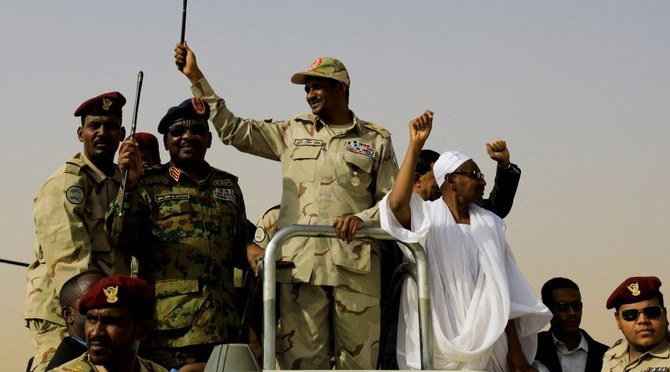
- ARAB NEWS
- 04 Jul 2025

It was almost inevitable that the two reluctant partners that have jointly ruled Sudan for the past four years were destined to fight each other as a political accord to hand over the reins of power to a civilian government was to be signed and adopted earlier this month. But the faceoff between Sovereignty Council president and top army chief Gen. Abdel Fattah Al-Burhan and head of the notorious Rapid Support Forces militia Gen. Mohammed Hamdan Dagalo has little to do with restoring democracy or ending decades of hardship for the people of Sudan. It is in fact a power struggle and a fight between the forces that carried out the 2019 military putsch against long-time dictator Omar Bashir.
For the people of Sudan, there is little sympathy for either man. Al-Burhan and deputy Dagalo have derailed previous attempts to restore civilian rule and, while the signing last December of the Framework Agreement was a significant breakthrough, the fact that Dagalo had caveats about the timeframe for integrating the RSF into the regular army was always going to be a deal-breaker. Other issues for both men involved articles in the agreement regarding divesting the military from economic activities and investigating abuses by the military against civilians.
It is not clear how this week’s bloody clashes began or which side to believe when it comes to news from the battlefield. Both sides claim to have scored significant gains, but by Monday evening it was clear that neither side had come out on top and that skirmishes were taking place at key points in the capital, including the army headquarters, and elsewhere in the country.
One would assume that the regular army of about 250,000 well-equipped men, backed by fighter jets and heavy armor, will eventually overcome the lightly fitted RSF, whose numbers are said to be about 100,000. But the RSF is battle-tested, having fought for years in Darfur, and is an elite force that Bashir had selected to be his personal militia. In fact, it is believed that Dagalo’s decision to back the military coup against his boss was instrumental in toppling Bashir’s regime.
While Al-Burhan himself cannot be trusted to oversee the restoration of civilian rule, it is imperative that the Sudanese army emerges as the winner in this confrontation. A defeat of the army, while difficult to imagine, would be catastrophic for Sudan and its territorial integrity. Aside from dire economic and social conditions, the specter of partition and civil strife continues to haunt the country. Tribes in the economically vital eastern region are becoming restless and voices calling for secession are echoing again. Also hanging in the balance is the future of peace in Darfur and southern Sudan. A prolonged military confrontation could also trigger tribal wars in different parts of the country.
So far, neither Al-Burhan nor Dagalo has agreed to a lasting ceasefire or to peace talks. Al-Burhan escalated things by disbanding the RSF and declaring Dagalo a mutineer. For his part, Dagalo has accused Al-Burhan of leading an Islamist takeover of the country in an attempt to tie the general to Bashir backers. Such accusations are meant to send cryptic messages to outside parties, both regional and beyond, that have a vested interest in what is happening in Sudan.
It was interesting that Israeli Foreign Minister Eli Cohen, who visited Khartoum in February, warned of a radical Islamist infiltration in Sudan and confirmed that Israel is trying to calm the situation there. Both Al-Burhan and Dagalo have met Israeli officials and are on record supporting the normalization of relations between the two countries.
Dagalo has regional connections and RSF fighters have been dispatched as mercenaries to fight outside Sudan. This is probably why Al-Burhan was quick to warn foreign parties against interfering in the current crisis.
A defeat of the army, while difficult to imagine, would be catastrophic for Sudan and its territorial integrity.
Osama Al-Sharif
The situation in Sudan is critical to the stability of the immediate region. The US, Russia, Egypt and Israel all have a stake in how things turn out. What is worrying is that neither side will be able to seal a quick victory. The current conflict could drag on for weeks and even months. If Dagalo is forced out of the capital, he could retreat to Darfur and wage a guerilla war against the military and inside cities. In either case, the country will slide into turmoil and a humanitarian crisis will soon ensue.
If a stalemate prevails with no conclusive end, then mediators may be able to bring the two sides to the table. That may not be good for the future of Sudan. A situation where both sides remain on the ground will weaken the country and, more importantly, imperil the implementation of the Framework Agreement.